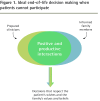End-of-life issues in advanced dementia: Part 1: goals of care, decision-making process, and family education
- PMID: 25873700
- PMCID: PMC4396757
End-of-life issues in advanced dementia: Part 1: goals of care, decision-making process, and family education
Abstract
Objective: To review the issues with setting goals of care for patients with advanced dementia, describe the respective roles of the physician and the patient's family in the decision-making process, and suggest ways to support families who need more information about the care options.
Sources of information: Ovid MEDLINE was searched for relevant articles that were published before March 7, 2014. There were no level I studies identified; most articles provided level III evidence.
Main message: For patients with advanced dementia, their families have an important role in medical decision making. Families should receive timely information about the course of dementia and the care options. They need to understand that a palliative approach to care might be appropriate and does not mean abandonment of the patient. They might also want clarification about their role in the decision-making process, especially if withholding or withdrawing life-prolonging measures are considered.
Conclusion: Physicians should consider advanced dementia as a terminal disease for which there is a continuum of care that goes from palliative care with life-extending measures to symptomatic interventions only. Clarification of goals of care and family education are of paramount importance to avoid unwanted and burdensome interventions.
Copyright© the College of Family Physicians of Canada.
Figures
References
-
- Mitchell SL, Teno JM, Miller SC, Mor V. A national study of the location of death for older persons with dementia. J Am Geriatr Soc. 2005;53(2):299–305. Erratum in: J Am Geriatr Soc 2005;53(4):741. - PubMed
-
- Houttekier D, Cohen J, Bilsen J, Addington-Hall J, Onwuteaka-Philipsen BD, Deliens L. Place of death of older persons with dementia. A study in five European countries. J Am Geriatr Soc. 2010;58(4):751–6. - PubMed
-
- Hertogh CM. Advance care planning and the relevance of a palliative care approach in dementia. Age Ageing. 2006;35(6):553–5. - PubMed
-
- Goldberg TH, Botero A. Causes of death in elderly nursing home residents. J Am Med Dir Assoc. 2008;9(8):565–7. Epub 2008 Sep 7. - PubMed
Publication types
MeSH terms
Grants and funding
LinkOut - more resources
Full Text Sources
Medical
Research Materials


